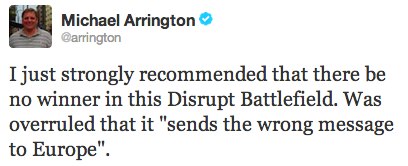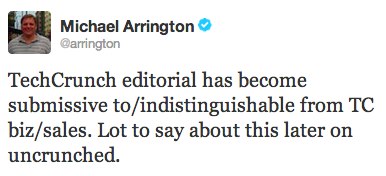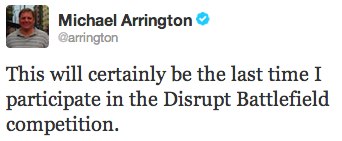I’ll be on stage in just a couple of hours at TechCrunch Disrupt in San Francisco. I’m interviewing a lot of people over the next three days, including CEOs, entrepreneurs, VCs and politicians. See here for my interview schedule, here for the full schedule.
This conference is a little different for me than the dozens of ones that have come before. Why?
Last night Paul Graham asked me if I still love startups. I think what he was asking was if the chemical full on in love affair that I had with startups in the early days of TechCrunch is still going strong, or has morphed into something else over time, as all great loves mellow and evolve.
What involuntarily came out of my mouth had little to do with the question. And I’m pretty sure it’s a theme, bubbling under the surface, that is going to take up a big part of my brain space at Disrupt:
“I’m scared of our government and I’m disgusted by what little Silicon Valley has done to fight it.”
Just today I’m reading yet a new NSA document that laughingly refers to us (the people) as “zombies.”
Who knew in 1984…that this would be big brother [picture of Steve Jobs with iPhone}…and the zombies would be paying customers [pictures of people with phones, tablets]?”
We’ve been dehumanized. At best our government considers us meaningless sheep to be herded/slaughtered at will. At worst they consider us all terrorists or potential terrorists, needed to be watched at all times.
I’ve watched the months of debate. Debates where the government sucks up every bit of information on everyone it can, then argues that as long as it isn’t looking at that data the Fourth Amendment is intact.
But then argues that since they got the data legally, they can certainly look at it, too.
It’s a vicious cycle. Collecting mass data isn’t a violation of the Fourth Amendment. Then once they have it, looking at it doesn’t require a warrant.
As I’ve written before, I don’t believe this is a system to fight terrorism. I believe it is terrorism, against the American people and everyone else in the world.
I’ve brought this up in every one of my preparation meetings with the people I’ll be interviewing.
There has been some pushback. Some people don’t want to talk because lawyers. Others say this isn’t their fight and they can’t effectively lead their organizations from behind bars.
Others say they are willing to speak their mind.
In all cases I will ask the questions. We are inundated with denials and narrowly tailored “transparency reports”, but no company has stepped forward to tell us exactly what is really going on, and why the government seems so optimistic about being able to get user data from companies in real time or near real time, without any judicial oversight.
I’ll ask the CEOs if they feel any responsibility to protect their users against clearly unconstitutional (and just plain icky) government data grabs. I’ll ask them what they are willing to do, if they do feel responsible, to protect those users.
I’ll also ask the VCs and others about this, too.
For example, Right off the bat this morning I am going to ask Ron Conway, who has pushed for gun control via his Sandy Hook Promise for nearly a year now, hasn’t said a word about Silicon Valley’s role in the wholesale destruction of our human rights by the United States government.
He could do so much by leading an effort at real transparency, and a real pushback against the government. But he hasn’t lifted a finger. I want to know why.
He knows this question is coming, we discussed it last night.
And we’ll go from there. At the end of the conference I’ll write again and see what kind of answers we got from our leaders. Because I think we can handle the truth. I think we deserve the truth.
One thing I won’t do is ask the easy “gotcha” questions that I know can’t realistically be answered and that will only serve to make people look stupid. I’m not trying to just stir up the crowd at the expense of the speakers. But there are plenty of constructive and forward looking questions, including personal philosophy questions, that I think can be asked constructively. And secretly I think many of these people are just itching for the chance to say what they really think.




 Twice a year
Twice a year 

